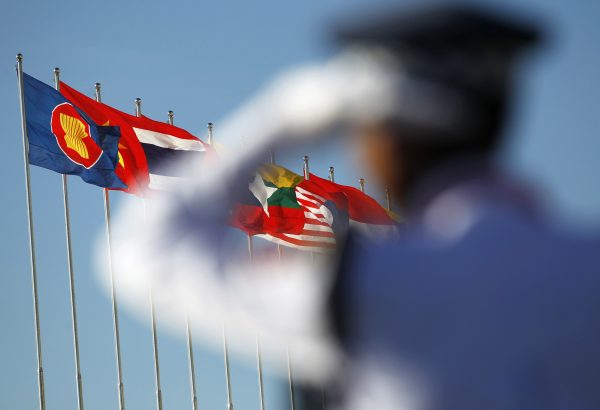An important lesson that ASEAN takes from Brexit is the need to socialise the economic benefits of regional integration. To be effective, ASEAN’s regional integration must be inclusive and the economic benefits widely shared and appreciated. Integration needs to be promoted within the context of enhancing domestic competitiveness and economic dynamism in an open and globally connected economic region.
The AEC, which came into force at the end of 2015, will be critical for an ASEAN that works for everybody, enhancing the quality of life of the ASEAN people. To a large extent, the AEC will deliver benefits to the community through the business sector in partnership with governments and other stakeholders.
The AEC blueprint involves much more than economic integration; it is about concerted domestic reform and good governance, which has potential benefits for all. The drive towards a more inclusive ASEAN is already embodied in the text of the ASEAN blueprints; the challenge is in their implementation.
The AEC Blueprint 2025 includes measures for good governance and ‘effective, efficient, coherent and responsive regulations, and Good Regulatory Practice (GRP)’. Better performing institutions — as reflected in regulatory quality, government effectiveness and control of corruption as well as reduced administrative burden on firms — enhance investment attractiveness and increase foreign investment inflows.
Improvements in the ‘ease of doing business’ in ASEAN, which benefit small enterprises more than large firms, will encourage entrepreneurship and firm creation. Improving the business environment for small- and medium-sized enterprises (SMEs) contributes to increases in total employment and household income. These are the tangible outcomes for the populations of ASEAN member states.
Currently there is a huge gap in how ASEAN member states perform on the World Bank’s governance indicators. Singapore ranks among the best in the world; Brunei Darussalam and Malaysia are the next best in ASEAN; while Laos and Myanmar bring up the rear among the ASEAN countries and remain very far down the global average.
ASEAN provides many examples of successful development to learn from and emulate in institutionalising good regulatory practice. For example, Vietnam’s Project 30 and Malaysia’s PEMUDAH could provide a model for future institutions in less developed ASEAN economies.
Vietnam’s Project 30 is the comprehensive inventory, review and simplification of all administrative procedures on the four levels of government. With the prime minister in charge of the project, Project 30 resulted in an accessible electronic database of about 5000 existing administrative procedures. 93 per cent of those procedures had been simplified by December 2014, and enhanced investors’ confidence in Vietnam’s reform efforts.
Malaysia’s PEMUDAH Task Force — consisting of top government officials and leading business leaders — has been central to the country’s drive to reform and modernise regulations. ASEAN should build on these successes and promote and facilitate similar programs in other ASEAN member states.
In Indonesia, the Philippines and Thailand there has been a high-profile policy emphasis on streamlining administrative processes and reducing regulations in the past year, as for example in Thailand’s Royal Decree on Review of Law and Licensing Facilitation Act, enacted in 2015, which can markedly reduce regulatory burdens if fully implemented over the next few years.
Together with the good regulatory practice forerunners in ASEAN — Singapore, Malaysia and Vietnam — ASEAN can seize the moment to develop and implement a long-term program to institutionalise good regulatory practice and cooperate on capacity building for regulatory institutions. ASEAN should aim for a more inclusive GRP implementation process by engaging SMEs and civil society in the review and streamlining of regulations. The business sector has a role to play in nudging ASEAN to implement and institutionalise GRP in each member country and the region.
In addition to equitable development measures, the Initiative for ASEAN Integration and the SME program, the AEC Blueprint 2025 could promote and embed inclusiveness in facilitation measures. Improving the linkages and complementarity of AEC measures with those in the ASEAN Socio-Cultural Community 2025 would be beneficial, especially in the pursuit of universal access to basic education and health care. This would contribute to a more inclusive, competitive and productive ASEAN.
The business sector and other stakeholders have a significant role to play in providing technical input, expert advice and up-to-date information for the effective implementation of AEC Blueprint 2025 measures. This is particularly important in standards and conformance, the implementation of good regulatory practice and streamlining non-tariff measures. Business can also play a role in stronger, systematic and regular monitoring and the review of the implementation of AEC Blueprint measures.
There are substantial benefits to be gained from deeper stakeholder involvement in a high performing, inclusive AEC. ASEAN is already a favoured investment destination, with larger foreign investment inflows than China or India. Five of the countries predicted to comprise the world’s top 15 investment destinations for multinational corporations in the next three years are ASEAN members: Indonesia, Malaysia, the Philippines, Vietnam and Myanmar. An AEC that works can make ASEAN an even more attractive investment destination leading to better employment opportunities, enhanced competitiveness, and robust and more equitable growth in the region.
The AEC blueprint sets out ASEAN’s plan for inclusive regional and economic integration. The business sector and key stakeholders need to get on board and push its implementation. The shock of Brexit provides the impetus to do so.
Ponciano Intal Jr. is Senior Economist at the Economic Research Institute for ASEAN and East Asia (ERIA), Jakarta.


Dear Pons,
As we have all come to expect from you, this is and excellent overview of how really serious economic cooperation should, and can work.
Thank you and best wishes,
Andrew
Thank you very much Andrew. With my warm personal regards, Pons